If you were tough enough to play Maher Cup you may as well make a quid in the ring as well. If you were good enough the money was better and boxing was probably not much harder than Rugby League Group 9 style.
Men successful in both arenas included Bill Brogan and Baden Broad from West Wyalong, Woody Field and Jockey Bourke at Gundagai, Harden’s Bernie McGrath, Coota legend Herb Narvo, Roy Plummer down at Wagga, Bob Banks from Tumut, Snowy Breasley at Junee, cherry man Alby Arabin and the notorious William George Maizey who played for Cowra in the 1930s.
At Birchgrove Oval on a rainy Saturday 27 August 1927, with the bell about to sound and the final scrum breaking up, Eastern Suburbs’ hooker George Clamback was observed to be out cold. His jaw had been broken in two places.
Big burly Balmain prop Bill Maizey may or may not have swung the punch. The referee and the linesmen saw nothing.
In the dressing room, after coming to Clamback said he didn’t see it coming. However in the crowd a couple of coppers claimed they saw it all. They swore on the bible that Maizey, a promising 23 year old pugilist, was the king hitting culprit. The Rugby League handed down a twelve months suspension. A record that was to last for almost 50 years until Les Boyd came down to the big smoke from Cootamundra.
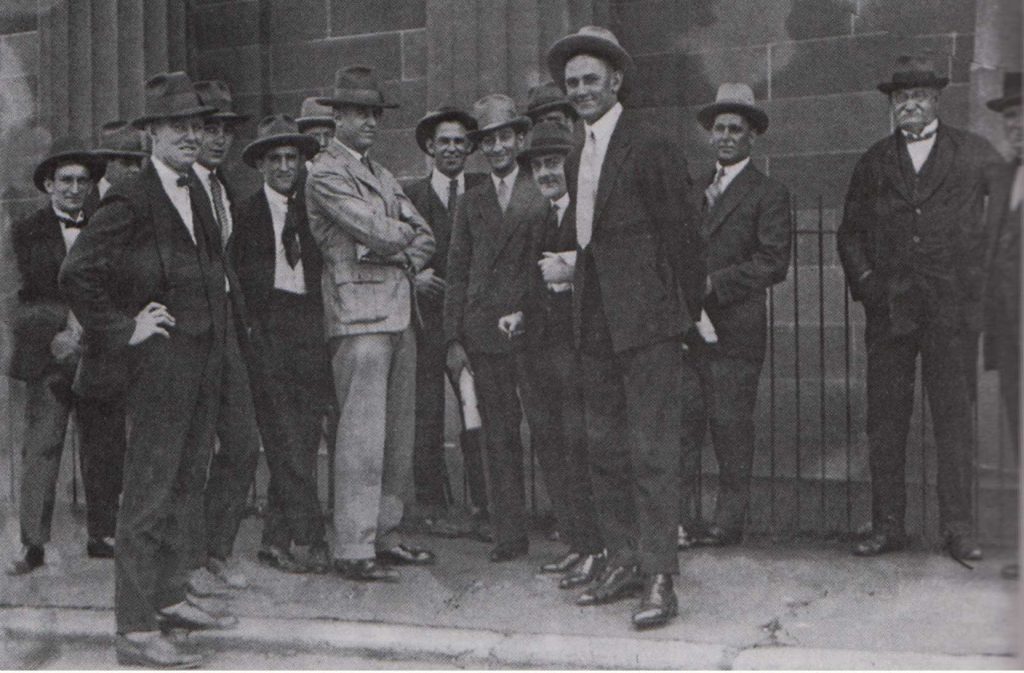
Balmain footballers and supporters outside the court – Bill with the hat tipped back. Source: Leichhardt: On the Margins of the City
Bill’s case didn’t end there. Ten days after the harbour-side match he was arrested, charged with causing actual bodily harm and bailed. Luckily representation was arranged with a young local lawyer who was the Member for Balmain – Doctor Herbert Vere Evatt. The prop’s innocence was so eloquently conveyed to the jury that they requested to hear no more and handed down an unequivocal acquittal. However the Rugby League’s suspension remained and Bill headed to the Central-West.
The second of six siblings, Maizey was born in Rozelle and raised in suburban Gladesville. The three elder Maizeys – Wal, Bill and Fred – were all keen sportsmen, into everything going. Wal and Fred later had careers in the police force.
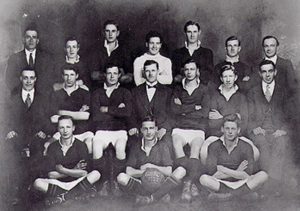
Bill Maizey 3rd from left in back row, and brother Wal 5th – Gladesville 2nd Grade 1922. Source: Ryde Public Library via Trove
As a teenager Bill started with bouts at school and the Ryde Town Hall. When he debuted at the Sydney Stadium in 1923 as a promising 19 year-old heavyweight his record was already 22-2. That year he also played first grade soccer and cricket for Gladesville.
A busy chap, in 1924 he married Violet Ringk, played soccer for the ‘Probables’ in a curtain raiser to the Australia v Canada test at the Showground, got knocked out at the Stadium, and commenced playing ‘A grade’ Rugby League for Gladesville.
In 1925 when his first son Billy was born he was also excelling at soccer for Gladesville. In Rugby League Bill not only joined the top grade at Balmain but in 1926 played for NSW in a 30-17 victory over Queensland in front of 46,779 at the SCG. 1927 was a quieter year, until the Birchgrove Oval match, as the responsibilities of family life meant more time spent in his carrier business and less with training.
Following the suspension the Maizey family, now including new baby Hazel, moved out to Lyndhurst, between Cowra and Blayney, taking along younger brother Fred. Vi had relatives in the area.
Bill coached nearby Carcoar in 1928 for whom the Jack Hore Gold Cup held by Canowindra was the local holy grail. Carcoar successfully appealed for a reduction of his sentence so he could lead them into the club’s big challenge. However he was hooted from the field after being sent off for striking Canowindra’s beloved coach Rex Norman, the former Australian representative footballer and State cricketer.
In 1929 he played for Lyndhurst, represented the Far West team at Country Week and continuing to have professional bouts in Sydney.
On the night of 30 June he was driving a car full of Lyndhurst players down Cowra’s main street when it collided head-on with a stationery vehicle. His honour was unconvinced that the supposed blowout of the left front tyre could cause the car to lurch suddenly by its own accord across to the right side of Kendall Street. That at least one of his passengers was clearly inebriated probably didn’t help the cause. Bill described as a ‘Mandurama mechanic’ was fined.
In 1930, as the Great Depression began to take hold he was fortunate to secure a paid coaching position with Cowra at £4 per week plus perquisites. He continued to box and be sent off. However we stayed the 80 minutes in August to lead his team of youngsters to a rare victory for the Jack Hore Gold Cup at Canowindra.
Teddy Taplin was appointed coach for 1931, and Bill continued to play tough football for Cowra. In a match at Grenfell the locals lamented the loss of the services of Clarrie Smith. ‘Clarrie tackled Maizey hard and brought him down, and was about to rise when Maizey hooked him on the jaw and almost knocked him out. Both players were sent off – one for delivering a punch and the other for taking it’.
On Boxing Day at Cowra Town Hall in the ‘Heavyweight Championship of the West’ Bill outpointed Jim Jeffries before a packed house paying £80 – more than most football matches. On Australia Day in the rematch Jeffries knocked Bill out.
Before the start of the 1932 season Bill was offered a job in Sydney. However Cowra countered with £4/10 per week just to play, leaving Teddy Taplin as coach.
The season started with great sadness when young team-mate Keith Pugh died after a match. Maizey himself was a frequent visitor to the hospital that year being laid up with a twisted knee and later concussion. It finished well when Hilton John Maizey, his third and final child, was born.
The legendary quality of Group 9 football had spread wide. Under Eric Weissel’s leadership Maizey was part of the team which toured northern NSW towns. In the final match, in Sydney, against Souths, described as a ‘fury of fists’ The Truth reported that Bill was lucky to stay on the park.
He was appointed Cowra’s coach again in 1933 from 20 applicants, but for only Depression wages of £3/10 per week. Now at 29 at the top of his game, he won selection in the Group 9 team again, was predicted to be a Kangaroo for the trip to ‘Blighty’, and in the first year of a true inter-town competition he coached Cowra to the southwest grand final at Leeton. He received his marching orders in key matches against Group 17 and Young.
At Tumut on 16 July Bill and Cowra’s fullback Allen Murray were abused by the crowd whenever either got the ball. Bill was abused for allegedly punching. Allen was jeered for having the temerity to be an Aboriginal.
Murray was the brother of Herbert ‘Doolan’ Murray a highly talented fighter from the Erambie Mission who was the second to Bill Maizey in many of his fights. Doolan had left Cowra for Griffith in 1929. In Group 17 vs Group 9 match above where Bill was sent off, Doolan, now aged 36, was the Group 17 hooker.
In 1934 Bill applied again to coach but the committee punted for Ern Rainer from Newtown. Maizey then accepted an offer from Blayney where his brother Constable Fred Maizey had been newly posted.
In addition Blayney had a brilliant young winger, later a Kangaroo, named Edgar Newham. Bill was the ‘proudest man’ when Blayney won both the Hutchinson Cup from Cowra and the Mockler Cup from Bathurst. He was also selected as prop for the Country team.
On Sunday 27 September Blayney played host to Bathurst Charlestons in a £50 winner take all match and with lots of side bets in the 2,000 crowd. Maizey and Bill ‘Tarzan’ Seivers started fighting, and after being warned by the referee to desist Bill replied with ‘I’ll ——— well punch you‘. He was sent off. However with Blayney behind, some 200 angry punters crowded the field and Maizey refused to leave. The referee abandoned the match. After police involvement and 25 tense minutes of negotiation it was decided to resume, but without Blayney’s captain. At resumption Seivers emerged with a bloodied nose courtesy of Constable Fred.
There were calls for Bills’s head. He may have been bad, but he was enormously popular. After the game Bill left his board at the Exchange Hotel and went back to Collaroy where Vi and the kids were residing with his parents. Belatedly he was handed a four week disqualification.
There were 70 applicants for Blayney’s coaching position in 1935. Bill was the victor. However after being refused permission by the club to play against Young for the Hutchison Cup with a poisoned arm (a sensible decision one would have thought) he offered his resignation. Not that this was a particular problem as he was able to secure a number of professional bouts and even fought in Jim Sharman’s Tent at the Blayney Show. Two months later they had made up and he was back in the job.
In 1936 he was offered the Goulburn coaching position for £6 per week but remained loyal to Blayney remaining unpaid until ‘the club’s finances are sound’.
The folks at Molong must have been sensitive back then, as the local magistrate placed Bill on a good behaviour bond following an altercation with spectators. He directed the following towards the sideline spruikers: ‘For ____ sake, give a man a chance, you lot of ____nit wit yokels; any one of you can see me after the match.’
Moving on he was employed as a barman at the Koorawatha Hotel in 1937 and coaxed into returning to the Cowra team now coached by Max Gray. In April Bill was sent off for engaging in fighting with Bob Navin, West Wyalong’s hooker and useful boxer. In June his mother died. In July in his first Maher Cup match Cowra defeated Young. They held off eight challenges to hold the cup for the rest of the season with a team remembered as being one of the best in the town’s history.
Jack Abel was appointed coach in 1938 but Bill at 34 was still an integral part of the side. Cowra lost the third Maher Cup challenge of the season to West Wyalong, ironically, now coached by Max Gray. Abel complained that the Cowra boys were unreliable attendees at training and in June took a job at Armidale.
Bill filled in as coach and at their next challenge at Temora on 27 July they regained the Cup. Arch-rivals Cowra and Young were to meet the following week. Unfortunately the Sydney referee Mr Murphy was unaccustomed to the donnybrooks that often broke out in Maher Cup football. He even bothered to complain that he was offered a bribe before the game.
Anyway after Bill Maizey and Young’s Mick O’Rourke were sent off after a dust-up it all became a fiasco and Murphy left the field, announcing that he was engaged to referee football, not a fight. Maizey was handed his second 12 months ban. A life sentence for a man his age cried the Lachlan Leader. Worst still, Young kept the Cup and Cowra wouldn’t win it again until after the War.
The next stop was Yass. His disqualification was lifted in May 1939 and he secured two jobs, barman at the Australian Hotel and reformer of the Yass team. He brought a brilliant black centre from Cowra with him – Dougie Williams. Now aged 35 Maizey was described as ‘somewhat of a spent force’ but he also was a natural leader of men, even though he started taking it easy at fullback rather than always playing prop.
The Massy Cup was the holy grail at Yass, and in July the team went to Goulburn and brought it home 27-7. In September war broke out and Yass won the Group 8 championship in the grand final against Canberra. Somewhat predictably Bill was sent off.
In October at a testimonial dance and presentation held to celebrate ‘the wonderful success achieved by the Yass team’. Bill gratefully received a gratuity of £27/10.
Bill stayed on at Yass in 1940. However football was winding down as attention turned to war. The next year he enlisted in the AIF at Yass and was based initially in Cowra where he played Maher Cup football while in camp. Tragically his elder son Billy died aged just 16 on 29 September 1941. Bill quickly rose to Sergeant in the Australian Army Training Division.
In 1945 Maizey coached Cowra to Maher Cup victory again and with an undefeated Cup run retired.
He was fondly remembered at Cowra for his coaching skills, and particularly by Indigenous players. In 1948 Harry Chong Sun raised a motion to seek Maizey’s services again as a non-playing coach. The club agreed but Bill had settled back into city life.
He continued to drive, taxis this time. Living with his family in the Fairfield area he passed away in 1971, aged 67.
Although Bill Maizey only played in 15 Maher Cup matches he is well remembered with affection in Maher Cup country as one of the toughest men in a tough sport during the toughest times.
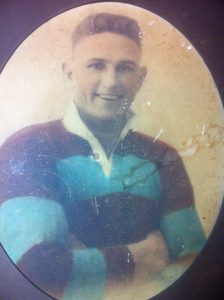
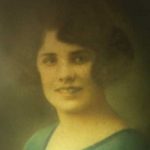
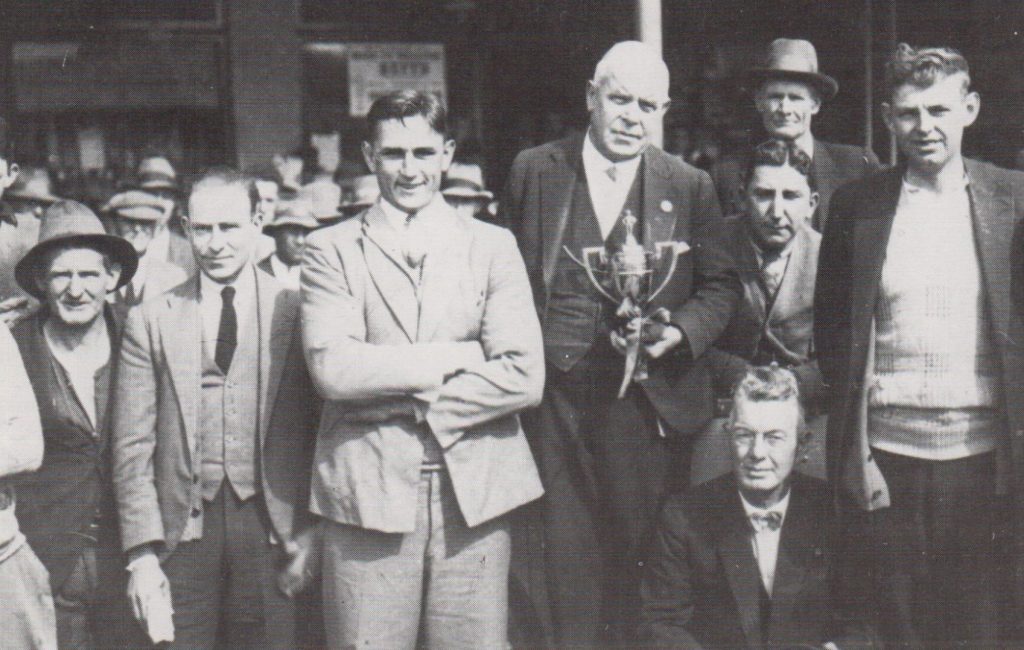
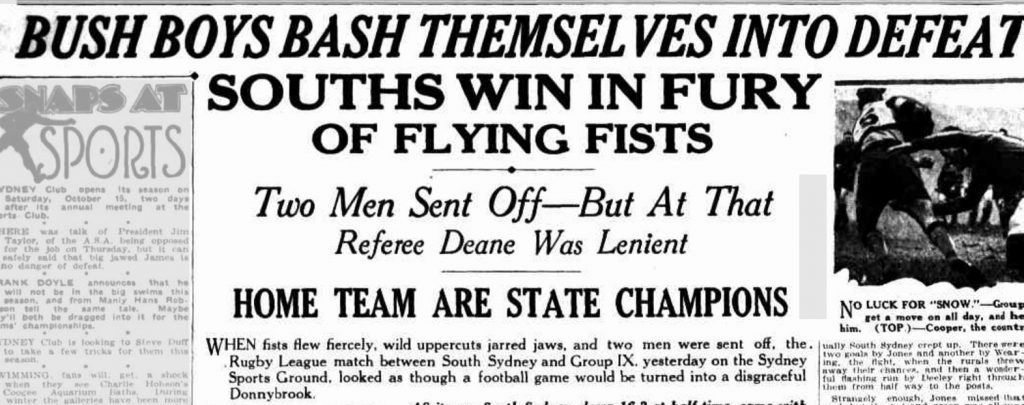
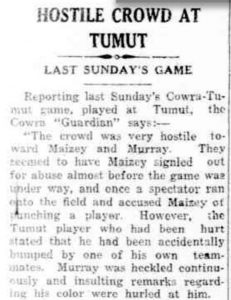
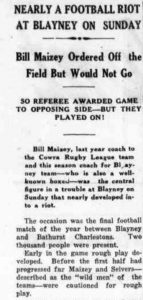
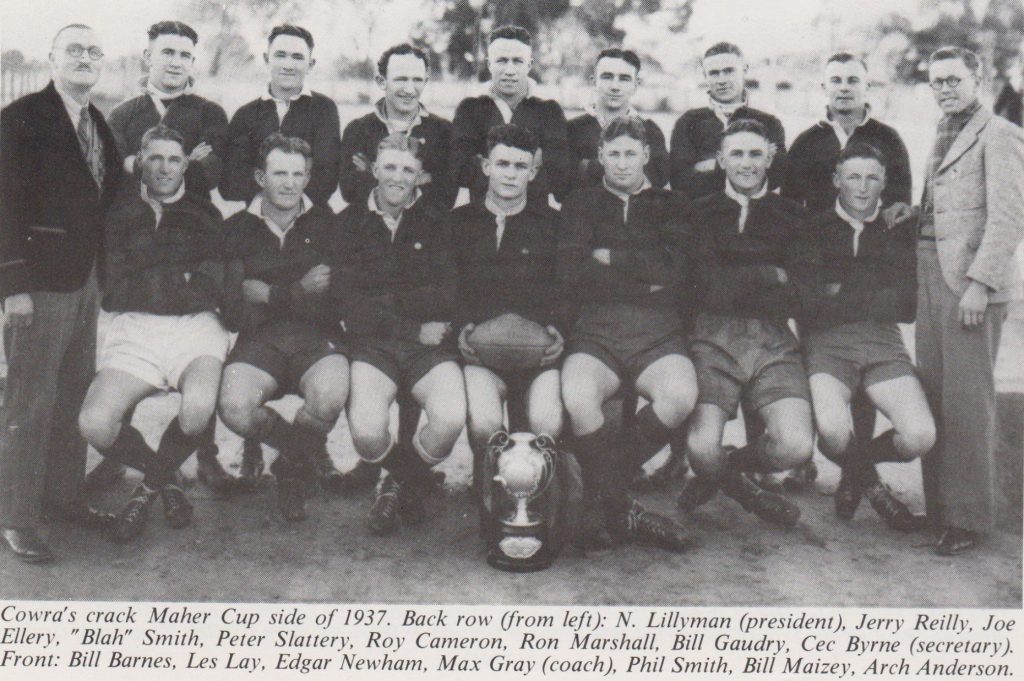
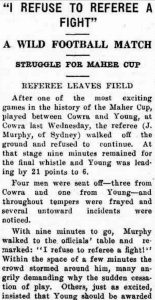
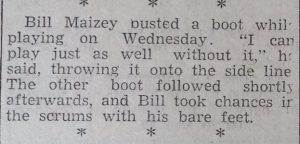
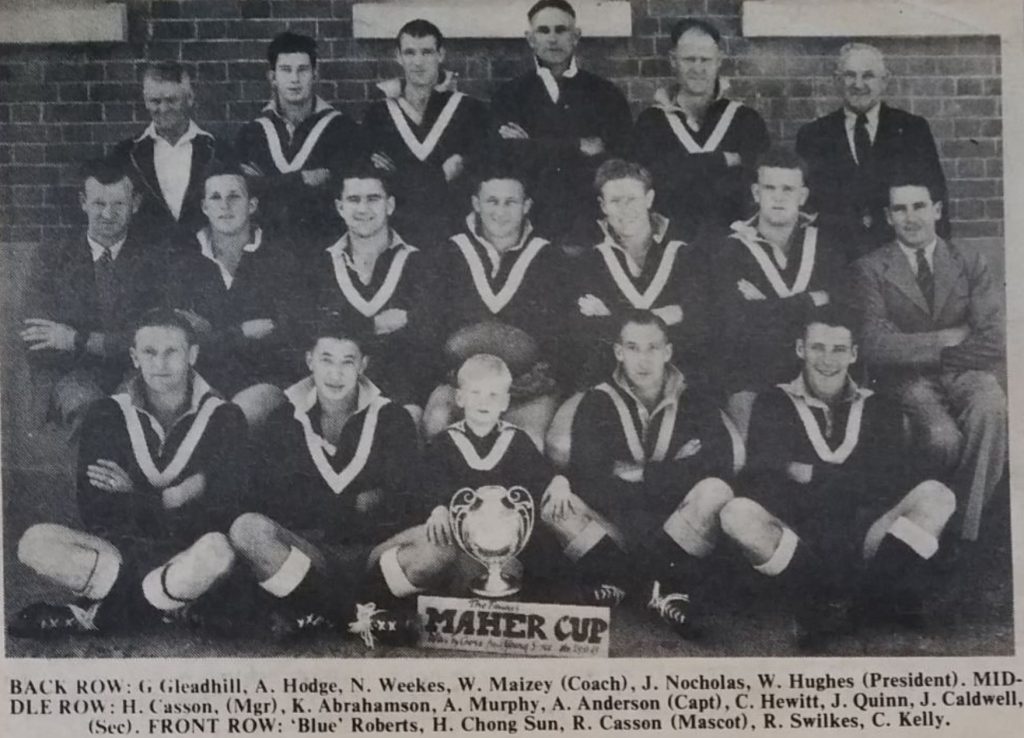

A Great Read
A wonderful story great read, No doubt a lot of Cowra people will remember a lot of names as i do. My late husband Gary (Dick) McGrath played for Eugowra and Cowra years played for Cowra 1970 72 thanks for the story
Ron. I’ve read that the Cowra team had at least 9 players from the army/POW camps in 1945. If we look at the team that won the Cup from Young we have: Curley’ Hewitt, N. Weekes, Harry Chong Sun,
Allan Murphy, Charlie Johnston, Jim Quinn, C.
Butler, R. Kelly, Archie Anderson(c), Alf Hodge,
Arch Bamblett, Arthur ‘Blue’ Roberts, J.
Manning. My thinking is that Weekes, Murphy, Johnston, Butler, Kelly, Hodge and Manning may have been from the camps. Have you any recollection?
Curley Hewitt, Norm Weekes, Jim Quinn, Allan Murphy, Charlie Johnson, Jim Quinn, Ray Kelly, J Manning, Kevin Abrahamson were all from the Army & POW Camps. Not sure about Butler and Manning but they probably were from the Army Camp. Harry Chong Sun, Arch Anderson, Bluey Roberts and Alfie Hodge were all locals. Harry Chong Sun was just out of high school.
that’s my great uncle
Hi Bill. Re you great uncle Bill Maizey. He may well have died before you were born, but I wonder if you have any insight into his relations with Aboriginal people. He seemed to have a close relationship with top boxer/footballer Doolan Murray from Erambie Mission – and it looks like he was instrumental in bringing Indigenous players into both the Cowra and Yass teams. In short he may have been very influential in tearing down the colour bar in Rugby League. Neil 0448440110 neiljpollock@gmail.com
Hi Neil, Yes he did die before i was born, i needot correct my previous statement – William George Maizey was my maternal great grandfather. His daughter Hazel Violet Maizey, was my grandmother. My grandmother did speak about him and talk about his relations with aboriginal people. I have not been able to find any supporting material from my grandmother though in relation to this.
Hi Bill,
I am interested in the history of the Maizey brothers. Do you have any information about the other brothers? My uncle was doing some research on the family tree, but I am not sure how far he got and he died some time ago.
I am based in Brisbane. Regards Judith Maizey
Wal Maizey was my grandfather. I never meet Bill Maizey, but heard about him from my father, Stan Maizey.